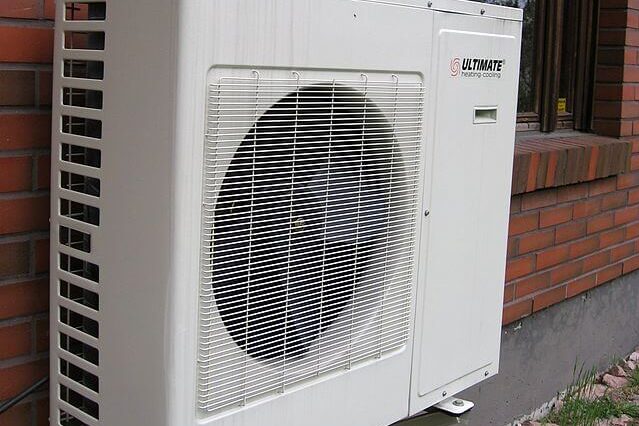
The government’s ambitious plan to make household heating more environmentally friendly through the Boiler Upgrade Scheme has experienced a disappointing start in its first year.
The scheme offers £5,000 grants to households to help them switch to heat pumps, which produce fewer emissions compared to gas boilers. However, in its inaugural year, the scheme fell short of its target, only managing to issue half of the intended 30,000 grants in England and Wales. Experts attribute this underperformance to a scarcity of installers and the high cost of preparing homes for heat pump installations.
The UK government has set a goal to achieve net-zero carbon emissions by 2050, and heat pumps play a crucial role in this endeavour, as home heating currently accounts for 14% of the country’s carbon emissions. The latest data on the grants issued under the scheme, released on Thursday, coincides with the UK’s Climate Change Committee’s (UKCCC) recent assessment that the government is “significantly off track” in meeting its climate goals. The scheme is set to run until 2028.
According to the UKCCC, the main reasons for the scheme’s low installation rates are the high cost of heat pumps, the scarcity of trained installers, and the lack of energy efficiency measures such as insulation, which enhance the effectiveness of heat pumps. The unused £70 million in grants from last year cannot be carried over to future years and will be returned to the Treasury.
A spokesperson for the Department of Energy Security and Net Zero, which is responsible for the scheme, said: “Industry has reported an increased level of enquiries and we are confident that deployment will increase as the year progresses.”
In response to concerns raised by the Lords Committee in February about the scheme’s underperformance, the government launched a marketing campaign to promote it. Although the campaign saw increased online engagement, the number of vouchers given out actually declined since March. The government plans to undertake further promotion later this year.
To meet its climate targets, the government aims to install 600,000 low-carbon heat pumps annually within five years, a rate that is currently only one-ninth of the target. While the Boiler Upgrade Scheme offers grants to help with the cost, the installation of heat pumps can still be expensive, sometimes reaching £10,000, compared to a few thousand for a new boiler. However, some energy suppliers are now offering heat pumps for under £3,000 for certain properties.
“The demand is there for the consumer but not the installer. We need a stronger policy that we are going to phase out boilers,” he said.
One of the factors contributing to the high costs is the need for additional insulation to improve heat pump efficiency, as the UK’s old housing stock is among the worst insulated in Europe. The government has announced a new scheme to deliver 376,000 insulation measures between 2023 and 2026 to address this issue.
Despite the challenges, there is optimism that the scheme will improve in the future. As costs for heat pumps continue to decline, the Scottish government is offering a larger grant of £7,500 and an additional £7,500 as a loan to cover the full cost of a heat pump. Additionally, the transition to cheaper renewables could bring down the cost of running heat pumps over time.
The government is also planning to consult on a new methodology for assessing and producing Energy Performance Certificates (EPCs) later this year. Currently, the calculation for EPCs can penalise homeowners for installing heat pumps, as it assumes high long-term electricity costs compared to gas without considering the efficiency of the heating system.
The government aims to encourage home improvements by requiring all new tenancy properties to have an EPC rating of C by 2025.
——————————————————————————
At Natural World Fund, we are passionate about stopping the decline in our wildlife.
The decline in our wildlife is shocking and frightening. Without much more support, many of the animals we know and love will continue in their decline towards extinction.
When you help to restore a patch of degraded land through rewilding to forests, meadows, or wetlands, you have a massive impact on the biodiversity at a local level. You give animals a home and food that they otherwise would not have had, and it has a positive snowball effect on the food chain.
We are convinced that this is much better for the UK than growing lots of fast-growing coniferous trees, solely to remove carbon, that don’t actually help our animals to thrive.
This is why we stand for restoring nature in the UK through responsible rewilding. For us, it is the right thing to do. Let’s do what’s right for nature!
Donate today at https://naturalworldfund.com/ and join in the solution!

